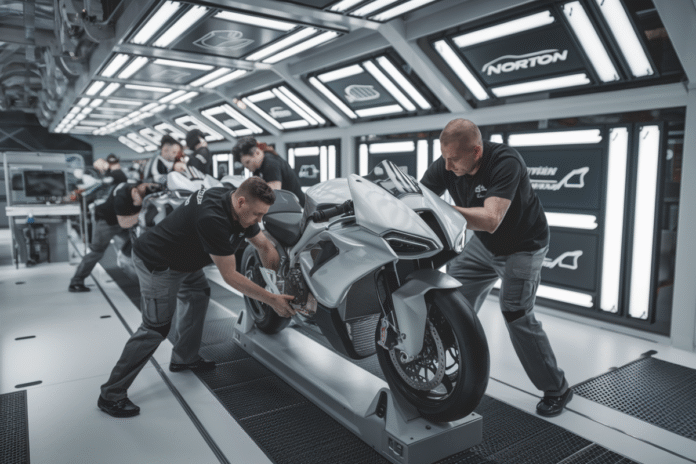“The future of manufacturing hinges on bold investments.” As the automotive industry evolves, companies must adapt to stay competitive. A significant move has been made by a prominent player, reflecting a commitment to innovation and modernization in manufacturing processes. The recent investment of $245 million into the Solihull facility not only aims to enhance production capabilities but also emphasizes the importance of sustainability and efficiency in today’s market. This strategic decision raises questions about the potential impact on production output, job creation, and the overall landscape of the automotive sector.
The stakes are high as the global automotive market faces unprecedented challenges, including supply chain disruptions and increasing consumer demand for eco-friendly vehicles. This substantial financial commitment signifies a pivotal moment for the manufacturing facility, which is expected to undergo significant upgrades. The infusion of capital could lead to advanced technologies being implemented, ultimately transforming the production process. How will this investment shape the future of automotive manufacturing, and what implications will it have for the workforce and the environment?
Revamping Manufacturing Capabilities
The recent investment is set to overhaul the Solihull manufacturing facility, which has been a cornerstone of production for many years. With the automotive industry increasingly focusing on efficiency and sustainability, the modernization of this facility is crucial. The funds will be directed towards upgrading machinery, enhancing production lines, and integrating advanced technologies such as automation and artificial intelligence. These changes are designed to streamline operations, reduce waste, and improve overall productivity.
Moreover, the incorporation of cutting-edge technologies is expected to facilitate the production of electric vehicles (EVs), aligning with the industry’s shift towards greener alternatives. According to industry analysts, the demand for EVs is projected to rise significantly in the coming years, making it essential for manufacturers to adapt their processes accordingly. By investing in this facility, the company is positioning itself to meet future market demands while also contributing to environmental sustainability.
This modernization effort not only aims to enhance production capabilities but also to create a more flexible manufacturing environment. The ability to quickly adapt to changing consumer preferences and technological advancements will be vital for maintaining competitiveness in the automotive sector. As the facility evolves, it will likely serve as a model for other manufacturers seeking to innovate and improve efficiency.
Economic Implications and Job Creation
The injection of $245 million into the Solihull facility is expected to have significant economic implications. This investment not only enhances the production capabilities of the facility but also has the potential to create jobs within the local community. As the facility upgrades its operations, there is likely to be an increased demand for skilled labor, particularly in areas related to advanced manufacturing technologies.
Local economies often benefit from such investments, as they can lead to job creation and stimulate surrounding businesses. The construction and implementation phases of the upgrades will require a workforce, potentially providing employment opportunities for skilled tradespeople, engineers, and technicians. Additionally, the long-term operational needs of the facility may lead to permanent job openings as production ramps up.
Furthermore, the economic boost from this investment could extend beyond immediate job creation. Increased production capacity may result in higher output and sales, contributing to the overall growth of the company and its suppliers. This ripple effect can foster a more robust economic environment in the region, attracting additional investments and enhancing the local industrial landscape.
Environmental Impact and Sustainability Goals
As the automotive industry faces increasing scrutiny regarding its environmental impact, the investment in the Solihull facility underscores a commitment to sustainability. Upgrading manufacturing processes with eco-friendly technologies can significantly reduce the carbon footprint of production activities. This aligns with global efforts to combat climate change and meet regulatory standards aimed at reducing greenhouse gas emissions.
The integration of advanced manufacturing techniques, such as energy-efficient machinery and waste-reduction strategies, can help the facility minimize its environmental impact. By prioritizing sustainability, the company not only meets consumer demand for greener products but also positions itself as a responsible corporate citizen. This proactive approach in addressing environmental concerns can enhance brand reputation and attract environmentally conscious consumers.
Moreover, the shift towards electric vehicle production plays a crucial role in the company’s sustainability strategy. As more consumers opt for EVs, the demand for cleaner manufacturing processes will continue to grow. The investment in the Solihull facility is a step towards ensuring that the company is equipped to meet these evolving market demands while contributing to a more sustainable future.
Future Prospects and Industry Trends
The significant investment in the Solihull facility reflects broader trends within the automotive industry. As manufacturers navigate the complexities of a rapidly changing market, adaptability and innovation are paramount. The focus on electric vehicles, automation, and sustainable practices is reshaping the landscape, and companies that embrace these changes are likely to thrive.
Industry experts suggest that the shift towards electrification and advanced manufacturing will continue to accelerate. As consumer preferences evolve, manufacturers will need to be agile in their production methods. The investment in the Solihull facility positions the company to not only respond to current market demands but also to anticipate future trends. This forward-thinking approach can provide a competitive advantage in an increasingly crowded marketplace.
Looking ahead, the implications of this investment extend beyond immediate operational improvements. It signals a commitment to long-term growth and innovation, essential for navigating the challenges and opportunities that lie ahead in the automotive sector. The ability to adapt to changing technologies and consumer preferences will be crucial for any manufacturer aiming to succeed in this dynamic environment.


